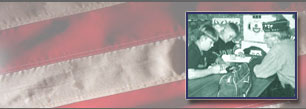Participate in the Project >> Suggested Questions
Suggested Questions for Civilians
Segment 1: For the Record
State at the beginning of the interview:
- Date and place of the interview
- Name of the person being interviewed
- Interviewee's birth date
- Names of the people attending the interview (including the interviewer and camera operators)
- The organization you're working with, if any
- If interviewing a veteran:
- War and branch of service
- What his or her rank was
- Where he or she served
- If interviewing a civilian:
- What type of work he or she performed
- Where he or she served
- What war he or she served during
Segment 2: Jogging Memory
What is your name? For married women, what was your maiden name?
Age?
Where were you born and raised?
What was your family background? Educational background?
What is your current occupation? Current address?
At the time of the war, were you in a relationship, married, or single?
What was your spouse's or partner's name and wartime occupation (if interviewed
for that reason)?
If married, when and where were you married?
Did you have children at any time during the war?
Segment 3: Wartime Work
Where did you live/work during the war?
What was your main wartime activity?
Were you employed outside the home?
In industry?
Why did you choose that activity?
What kind of training were you given?
What was your title?
What kind of activities did you perform?
Who was your supervisor?
What was your specialty at work?
What did you like and dislike about it?
What special rules or conventions did you have to follow?
With whom did you work?
If you had children, was there child care at work?
If not, what arrangements did you make?
Were you unionized?
Were you an organizer?
How did you feel about the unions?
Did you develop friendships during training or the activity itself?
Did you have family and friends in the service or doing war work?
Segment 4: Life During Wartime:
General:
How did you feel about the war?
What were your family or friends' feelings?
Did you live with family, friends, or coworkers?
In what ways did the war change your activities or habits?
Were you or others in your community treated differently because of your gender/ethnicity/race
or other factors?
If so, how did you or others react?
What were some of the first changes in your life after the war started?
What different responsibilities did you have to take on?
What social activities were you involved in at work or after work with coworkers?
How did you entertain yourself outside of work?
Did you or others get married during wartime?
What were weddings like?
Did you worry that our side might not win?
Did you know anyone who was killed or wounded in the war?
Tell me about corresponding via letters or otherwise with friends or family
in the service.
What effect did the war have on your physical and mental health or that of
others you knew?
Do you think that medical care changed because of the war?
Did you have worthwhile experiences because of the war?
What was your most memorable experience? Most memorable character? Most humorous
experience?
Have you visited any memorials or participated in any commemorations of the
war?
World War I and World War II:
Was there a lack of social opportunities and friends because of
the war?
How did your community respond to the war and civil defense (or other home
front) initiatives?
Did child care activities change for mothers?
Tell me about shortages and rationing of food and gas.
Did you have a victory garden or other ways to get enough food?
How did you cope with wartime shortages?
Talk about recycling of rubber, grease, or other commodities.
To what extent was there hoarding or black market activity in your area?
How did you feel about war news from newsreels or radio?
Korea, Vietnam, and Persian Gulf Wars:
If your spouse was in the service, did you feel you got good support
from the service?
Were you comfortable and did you have a reasonable standard of living during
and after the war?
What effect did the war have on your physical or mental health?
Did you think it was right for America to be at war?
What did you think about the enemy?
How did you feel about war news from television?
How did you feel about antiwar protests?
Did you trust and support American civilian and military leaders?
Did you change your views over the span of the war?
Segment 5: Postwar Experiences:
How did you feel when the war ended?
What did you do when you heard the news? (For WWII: Where were you on V-J Day?
V-E Day?)
How would you describe the ways that the war changed your life and those of
others?
Did you keep your job or continue other wartime activities after the war?
Is there one thought about your wartime experience that you want to share with
future generations?
Segment 6: Closing Questions:
Is there anything else I should ask you?
Is there anything that you would like to add on this subject?
Participate in the Project >> Suggested Questions
|

